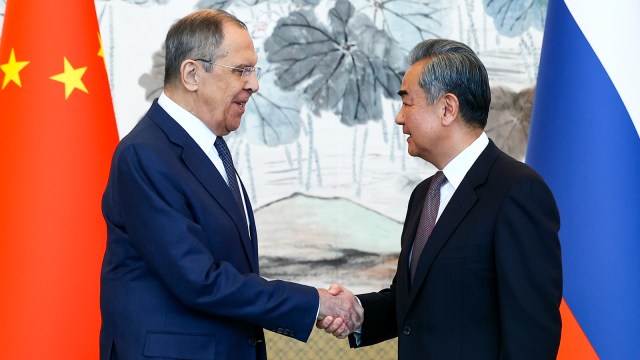
Russian Foreign Minister Sergey Lavrov’s recent visit to China was brief but significant. On the face of it, Lavrov was in Beijing to set the stage for an anticipated trip by President Vladimir Putin in May. To that end, he met China’s President Xi Jinping and Foreign Minister Wang Yi. Amidst the usual diplomatic pleasantries, three outcomes that emerged are particularly important from India’s perspective.
Converging strategic views
First, the strategic convergences between the two administrations are evident. In his comments, Wang Yi emphasised the importance of the China-Russia relationship, calling it “irreplaceable in maintaining global strategic stability and promoting cooperation among emerging powers.” Lavrov, in return, stressed that “Russia-China relations have reached an unprecedented high level…surpassing the old Cold War military alliance” between the PRC and the Soviet Union. Both countries seem to recognise the US and the broader West as a common challenge, and seek “multipolarisation and democratisation of international relations” while opposing “unilateralism and hegemony.”
Both also see parallels between NATO and groups like the Quad. Lavrov, in particular, attacked what he said was the “US policy of creating closed military-political alliances with a limited set of members”, arguing that these have “a blatant anti-Chinese and anti-Russian bias”. Wang, meanwhile, proclaimed China’s opposition to “small circles that engage in camp confrontation, especially in the Asia-Pacific region.” Needless to say, comparing the Quad, I2U2 or even the AUKUS agreement, for that matter, to NATO is deeply misleading. NATO is a security alliance. None of the other groupings mentioned above are comparable to NATO in that sense. Beijing and Moscow’s attempts to draw such parallels are deliberate attempts to undermine the success and appeal of these groupings. This, of course, is problematic from an Indian perspective, given the prominence that these new minilateral arrangements are occupying as part of India’s multi-alignment strategy.
Driving an anti-West narrative
Second, both China and Russia want to use constructs like the Global South and groups like BRICS and SCO as tools to shape a future world order that suits their interests. In fact, they have sought to use the pulpit that these forums provide to frame anti-Western narratives. It is no secret that Beijing and Moscow share a deep sense of discontent with what they believe is a Western-designed and dominated international order. The February 2022 joint statement between Xi Jinping and Vladimir Putin underscored this. The vision of a new order that the two sides have articulated since is essentially one that is dominated by major powers respecting each others’ core and sovereign interests, while carving the world into spheres of influence. The convergence between the two sides when it comes to the Ukraine war is an example of this. This was evident during the press briefing with Wang and Lavrov, where the latter took it upon himself to interpret China’s 12-point peace plan as implying that addressing the “root causes” of the conflict, i.e., NATO and the European security architecture, and Russian security concerns, must be prioritised, rather than the violation of Ukraine’s sovereignty and territorial integrity.
Such a vision does not necessarily align with India’s or even the desire for greater representation for countries in the Global South. For instance, Indian Foreign Minister S Jaishankar has clearly articulated that India’s approach to the international order is not one to “pull down the pillars” while defining the country as non-Western as opposed to anti-West. Essentially, if one thinks of international relations as a poker game, then while India and countries in the Global South want an equal seat and voice at the table, Russia and China seem to want to run the table.
A new security structure?
It is in this context that the final takeaway from Lavrov’s visit becomes important. Addressing the press, the Russian Foreign Minister said that the two sides “exchanged views on the prospect of forming a new security structure in Eurasia against the background of the complete stagnation and self-destruction of Euro-Atlantic mechanisms”. Later responding to a question, he added, “We have agreed with our Chinese friends to begin a dialogue on this matter and involve other like-minded countries.” While there are few details, the formal acknowledgement of this dialogue is indicative of the wheels being set into motion and the depth of the Sino-Russian partnership. This, of course, is a matter of serious concern for India, given its increasingly volatile relationship with China, the conflicts of interest between the two in the broader Indo-Pacific and New Delhi’s dependence on Russian arms supplies.
That said, there are challenges and divergences between China and Russia, evident during this visit, that are worth noting too. For instance, the intense emphasis on the importance of the Putin-Xi relationship as the driver of the relationship reveals challenges in terms of breadth and depth of support for closer ties. Also, both sides clearly have very different economic stakes when it comes to breaking from the West. Russia is now a pariah when it comes to the so-called “Western globalisation model”. Its urgency for alternatives is far greater. China, on the other hand, is seeking to firewall itself while maintaining deep interlinkages that serve its development. These are not insignificant cleavages.
Kewalramani is Fellow, China Studies and chairs the Indo-Pacific Studies Programme at Takshashila Institution. Kumar is a Research Analyst with Takshashila’s Indo-Pacific Studies Programme


